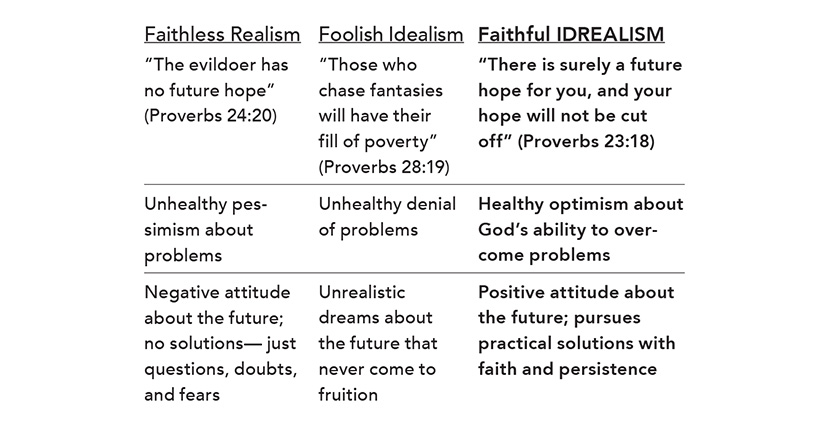Are You Idealistic or Realistic?
By David Faust
Idealists enjoy dreaming about the future. Vision comes naturally to them, and they eagerly embrace change. Christians who are idealistic have no problem praying for miracles and trusting God to do big things. The problem is, unbridled idealism can lead to foolhardy decisions, financial overreach, and overlooking important details that need to be addressed.
Realists, on the other hand, are practical and down-to-earth. Visionaries often view them as pessimistic and resistant to change. Realists ask, “What will it cost?” When a new idea is proposed, they immediately see the obstacles and bring up cautionary lessons learned in the past. Christians wired to be realists believe in prayer, but they know prayer isn’t just wishing on a star or rubbing Aladdin’s lamp to get what you want.
Must we choose between idealism and realism? Actually, it’s wise to embrace certain aspects of both. Christians should be realistic, because God exists and his Word is true—and truth is simply another word for reality. At the same time, the upward call of God should stir our vision and cause us to pursue ideals the world considers impossible to achieve.
I coined a word that pulls these concepts together. I think Christians ought to be idrealists (pronounced “I-DREAL-ists”)—idealistic and realistic at the same time. We can keep our feet on the ground while our eyes are on Heaven. We can be realistic without being cynical, and we can hold onto our ideals without being wild-eyed dreamers. We can live in the “now” while we anticipate the “not yet.” We can see the present and its problems honestly while viewing the future hopefully. This is the way of wisdom.
Jesus was an idrealist. He described both sides of the coin in John 16:33 when he said realistically, “In this world you will have trouble,” and then went on to say, “But take heart! I have overcome the world.” The apostle Paul constantly faced real-world problems. He was pressured, perplexed, and persecuted, but he never gave up his ideals. He believed in the resurrected Christ, so he fixed his eyes on the unseen (2 Corinthians 4:7-18).
Finding the Right Balance
The book of Proverbs advocates neither faithless realism nor foolish idealism. Instead, it urges us to pursue the way of wisdom, which I call “faithful idrealism.” Here is how it works:
In the real world, the ideal mingles with the not-so-ideal. A generous woman pours out her expensive perfume while Judas complains (John 12:1-8). One thief mocks and insults Jesus, while another repents (Luke 23:39-43). Generous donors support God’s work, while others give with dishonest, selfish motives (Acts 4:36–5:11). Through it all, God is at work, sculpting servants and saints out of rough-cut stones.
Dare to dream, but be wise. Be an idrealist.
Personal Challenge: If you tend to be more idealistic, what can you learn from your down-to-earth, practical-minded friends that might help your vision become reality? If you tend to be more realistic, how do you think the Lord wants to stretch your faith?


0 Comments